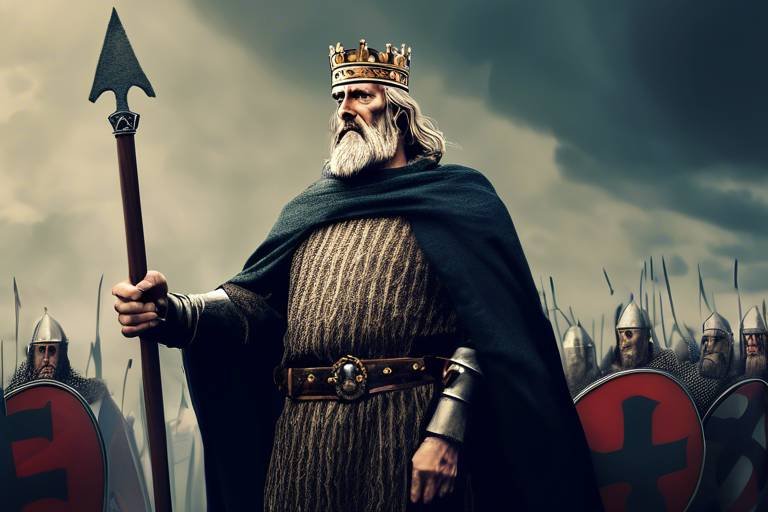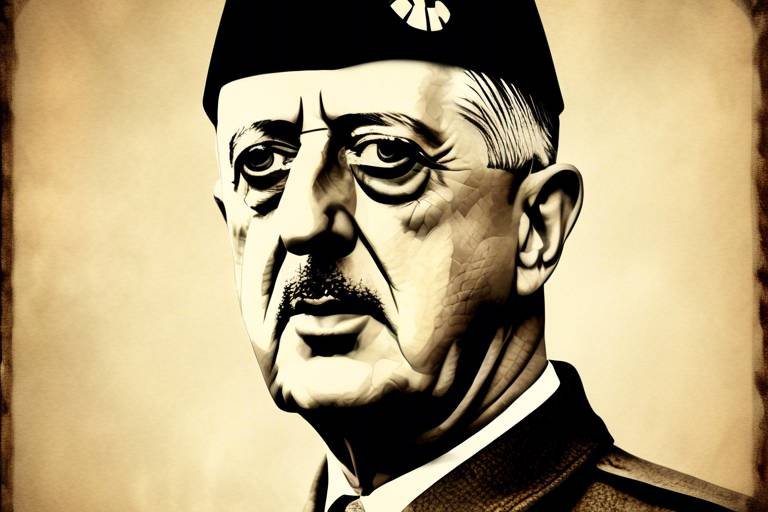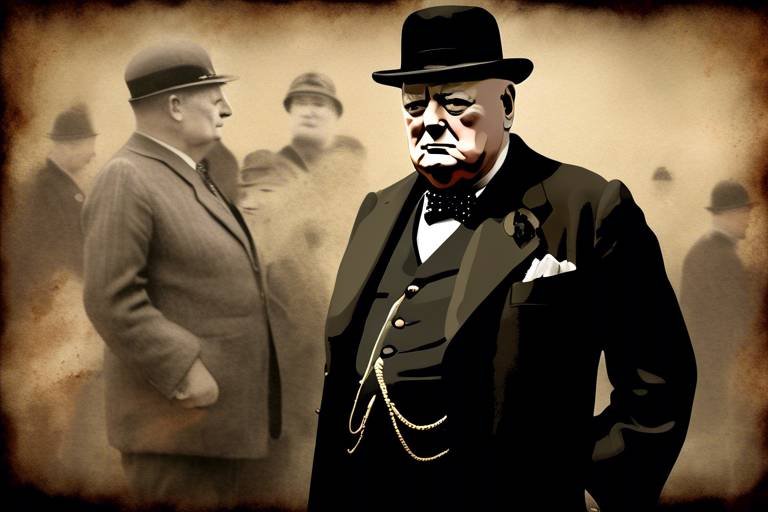Alfred the Great: The King Who Resisted the Danes
Alfred the Great, a legendary figure in English history, is renowned for his steadfast resistance against the Danes during a tumultuous period of Viking invasions in England. Born in the late 9th century, Alfred faced the daunting task of defending his kingdom, Wessex, against relentless attacks by Viking invaders who sought to conquer and pillage the land.
As a young prince, Alfred witnessed firsthand the devastation caused by the Danes, igniting in him a fierce determination to protect his people and preserve the sovereignty of his realm. Despite facing numerous setbacks and challenges, Alfred's unwavering resolve and strategic acumen eventually led to his ascension to the throne of Wessex, where he would earn the title of "the Great" for his remarkable accomplishments.
Alfred's reign marked a pivotal period in English history, characterized by his innovative military strategies, visionary leadership, and enduring legacy as a wise and just ruler. His efforts to resist the Danish incursions not only secured the survival of Wessex but also laid the foundation for the unification of England under a single monarch.
One of Alfred's most notable achievements was his development of the English navy, a groundbreaking initiative that revolutionized naval warfare and enabled the Anglo-Saxons to challenge the dominance of the Viking fleets at sea. By investing in the construction of ships and the training of skilled sailors, Alfred effectively countered the Danish threat and safeguarded the coastal regions from further incursions.
In addition to his military prowess, Alfred was also a visionary reformer who implemented significant changes in governance, law, and education. His legal reforms and establishment of a comprehensive code of laws promoted justice and order within the kingdom, setting a precedent for future legal systems.
Furthermore, Alfred's patronage of education and promotion of literacy were instrumental in fostering a cultural renaissance and intellectual revival in England. By supporting the translation of key texts and the establishment of educational institutions, Alfred laid the groundwork for the flourishing of learning and scholarship in his realm.
Despite the passage of time, Alfred's legacy endures as a beacon of leadership and resilience, inspiring generations of English monarchs and shaping the identity of the English nation. His legacy as the king who resisted the Danes remains a testament to his indomitable spirit and enduring impact on the course of English history.

Early Life and Ascension to the Throne
Alfred the Great, born in 849, was the youngest son of King Æthelwulf of Wessex. Growing up in a time of turmoil and Viking invasions, Alfred showed early signs of leadership and determination. Despite his noble lineage, Alfred faced many challenges in his youth, including the Danish attacks that ravaged his kingdom. Witnessing the devastation caused by the invaders, Alfred developed a deep understanding of the importance of defending his people and his land.
Upon the death of his brother King Æthelred in 871, Alfred ascended to the throne of Wessex at a time when the kingdom was under severe threat from the Danes. Despite the odds stacked against him, Alfred displayed remarkable courage and strategic acumen in leading his people against the Viking incursions. His coronation marked the beginning of a new chapter in the history of Wessex and the Anglo-Saxon realm.
Alfred's early years as king were marked by intense warfare and constant vigilance against the Danish invaders. Despite facing numerous setbacks and defeats, Alfred's determination never wavered. His resilience in the face of adversity earned him the respect and loyalty of his people, who saw in him a beacon of hope and strength during dark times.
Through a series of decisive battles and strategic alliances, Alfred gradually expanded his influence and consolidated his power in Wessex. His military successes, coupled with his vision for a united Anglo-Saxon kingdom, set the stage for his enduring legacy as one of England's greatest monarchs.

Strategies Against Viking Invasions
During the tumultuous period of Danish invasions in England, Alfred the Great implemented a variety of strategic measures to resist the relentless attacks by the Viking invaders. One of his key strategies was the construction of fortified burhs, or strongholds, across Wessex and other regions to provide protection and serve as bases for defensive operations. These burhs were strategically positioned to control key territories and provide early warning against Viking incursions.
Alfred also focused on improving the training and equipping of his army, implementing a system known as the fyrd, which required all able-bodied men to undergo military training and serve in defense of the realm when needed. This mobilization of local forces enabled a rapid response to Viking raids and invasions, enhancing the overall defensive capabilities of the kingdom.
In addition to military fortifications and mobilization, Alfred engaged in diplomatic efforts to establish alliances with neighboring kingdoms and tribes to present a united front against the Viking threat. By forging strategic partnerships and coordinating military actions with other Anglo-Saxon rulers, Alfred effectively pooled resources and manpower to counter the common enemy.
Furthermore, Alfred recognized the importance of intelligence gathering and information warfare in combating the Viking invaders. He employed spies and scouts to gather valuable intelligence on enemy movements and intentions, allowing for preemptive strikes and strategic positioning of defenses. This proactive approach to intelligence gathering gave Alfred a significant advantage in anticipating and countering Viking incursions.
Overall, Alfred the Great's strategies against Viking invasions combined military innovation, diplomatic maneuvering, and intelligence operations to create a comprehensive defense system that effectively thwarted the Viking advances and preserved the integrity of the Anglo-Saxon kingdoms during a critical juncture in English history.

Development of the English Navy
Alfred the Great's innovative approach extended beyond land-based defenses to the development of the English Navy, a strategic move that would prove crucial in safeguarding the kingdom against Viking incursions. Recognizing the importance of naval power in protecting his realm, Alfred initiated the construction of a fleet of ships capable of navigating the treacherous waters surrounding England. These vessels were not only used for defensive purposes but also for launching counterattacks against Viking longships, disrupting their raids and securing coastal territories.
Moreover, Alfred's organization of a formidable naval force marked a significant shift in English military capabilities, as he implemented training programs for sailors and commanders, ensuring a skilled and disciplined maritime presence. By equipping his navy with the latest advancements in ship design and weaponry, Alfred sought to challenge the dominance of the Danes at sea, effectively turning the tide of the conflict in his favor.
Through strategic naval engagements and coastal defenses, Alfred effectively utilized the English Navy as a deterrent against further Viking invasions, establishing a maritime supremacy that complemented his successful land-based strategies. The development of the English Navy under Alfred's reign not only secured the coastal regions of Wessex but also projected power and stability across the English Channel, deterring potential adversaries and safeguarding trade routes vital to the kingdom's prosperity.

Legal Reforms and Governance
During his reign, Alfred the Great implemented significant legal reforms and governance improvements that transformed the societal structure of Wessex. One of his notable achievements was the compilation of a code of laws that aimed to establish justice and order within the kingdom. These laws, known as Alfred's Dooms, were based on a combination of existing Anglo-Saxon laws, biblical principles, and Alfred's own insights into a fair legal system.
Alfred's legal reforms focused on ensuring equal treatment for all individuals, regardless of their social status. He sought to provide protection to the vulnerable members of society, such as the poor and the weak, by introducing measures that safeguarded their rights and prevented exploitation. By promoting a system of laws that applied to everyone, Alfred aimed to create a more cohesive and harmonious society.
In addition to his efforts in legal reform, Alfred also made significant strides in governance by improving administrative efficiency and accountability. He established a network of royal officials who were tasked with enforcing the laws, collecting taxes, and maintaining order throughout the kingdom. This system of governance helped centralize authority and ensure that the king's directives were carried out effectively.
Furthermore, Alfred implemented measures to enhance the infrastructure of Wessex, including the construction of fortified burhs (fortified towns) that served as centers of defense and administration. These burhs not only provided protection against external threats but also facilitated trade and communication within the kingdom, contributing to its economic development and stability.
Moreover, Alfred's emphasis on education and literacy as essential components of good governance set a precedent for future rulers. By promoting the translation of important texts into English and supporting the establishment of schools and monastic centers, Alfred sought to cultivate a well-informed and educated populace capable of participating in the governance of the realm.
Overall, Alfred the Great's legal reforms and governance initiatives laid the groundwork for a more just and orderly society in Wessex, setting a standard for future generations to uphold the principles of fairness, equality, and accountability in their governance practices.

Promotion of Education and Learning
Alfred the Great was not only a formidable warrior but also a visionary leader who understood the importance of education and learning in shaping the future of his kingdom. Amidst the chaos of Viking invasions and the struggle for survival, Alfred recognized the power of knowledge as a tool for progress and enlightenment. His promotion of education went beyond mere rhetoric; it was a fundamental aspect of his reign that left a lasting impact on the cultural and intellectual landscape of England.
One of Alfred's most significant contributions to education was his emphasis on literacy. Understanding that a literate population was essential for the advancement of society, he took concrete steps to promote reading and writing among his subjects. Alfred believed that education was the key to unlocking human potential and fostering a sense of unity and identity among the diverse peoples of his kingdom.
To support his vision of a more educated populace, Alfred established schools and monastic centers where both the nobility and commoners could receive instruction. These institutions became hubs of learning, where knowledge was preserved, shared, and expanded upon. By investing in education, Alfred laid the groundwork for a more enlightened and culturally vibrant society.
Furthermore, Alfred's patronage of learning extended to the translation of important texts from Latin to Old English. This initiative aimed to make knowledge more accessible to a wider audience and to ensure that valuable works were not lost to obscurity. By making these texts available in the vernacular, Alfred democratized learning and empowered his people to engage with the wisdom of the past.
Additionally, Alfred's promotion of education had a ripple effect on the intellectual development of his kingdom. The cultivation of a literate society led to a flourishing of art, literature, and scholarship, creating a rich cultural tapestry that reflected the vibrancy of the Anglo-Saxon world. Alfred's support for learning not only preserved the legacy of the past but also laid the foundation for future generations to build upon.

Legacy and Historical Impact
Alfred the Great's legacy and historical impact resonate throughout English history, casting a long shadow over the development of the nation. His reign as a wise and just ruler left an indelible mark on the English identity, shaping the course of the country for centuries to come. By establishing a strong foundation of governance and legal reforms, Alfred set the stage for a more organized and fair society, laying the groundwork for future generations to build upon.
Moreover, Alfred's contributions to education and learning were instrumental in the cultural revival and intellectual advancement of his kingdom. His patronage of education, including the translation of key texts into English, played a crucial role in fostering a sense of literacy and knowledge among his subjects. This emphasis on learning not only enriched the lives of his people but also contributed to the broader cultural landscape of England.
Alfred's influence extended beyond his own time, shaping the course of English history for centuries to come. His strategic military tactics and fortifications against Viking invasions set a precedent for defense that would be emulated by future monarchs facing external threats. The development of the English navy under his leadership marked a turning point in naval warfare, establishing a maritime force that would play a key role in safeguarding England's shores.
While myths and legends have inevitably surrounded Alfred the Great over the centuries, separating fact from fiction is essential in understanding his true historical impact. By delving into the historical records and primary sources, we can uncover the real achievements and contributions of this legendary king, whose legacy continues to inspire admiration and respect among historians and scholars alike.

Myths and Legends Surrounding Alfred
Myths and legends have shrouded the figure of Alfred the Great, embellishing his legacy with tales of heroism and supernatural feats. One prevalent myth surrounding Alfred is the story of him burning the cakes while seeking refuge in a peasant woman's home. This anecdote, although popular, serves more as a symbol of humility rather than a historical event.
Another enduring legend is Alfred's supposed disguise as a minstrel to gather information about the Danish forces. While the idea of a king going incognito makes for a captivating narrative, historical evidence supporting this tale is scarce.
One of the most persistent myths is the belief that Alfred founded the University of Oxford. While Alfred did indeed support learning and education, the establishment of Oxford University occurred centuries after his reign. This myth highlights the enduring impact of Alfred's patronage of knowledge and scholarship.
Furthermore, legends often depict Alfred as a solitary figure single-handedly fending off Viking hordes. In reality, Alfred's success in resisting the Danes was a result of strategic alliances, military reforms, and the resilience of the Anglo-Saxon people as a whole.
Separating fact from fiction in the tales surrounding Alfred the Great is essential to understanding the true nature of his achievements and the historical context in which he lived. While myths add color to his story, it is crucial to examine them critically and appreciate Alfred's legacy based on verifiable historical records.
Frequently Asked Questions
- Who was Alfred the Great?
Alfred the Great was an Anglo-Saxon king of Wessex known for his defense against Viking invasions and his contributions to education, law, and culture during the Danish invasions in England.
- What were Alfred's key achievements?
Alfred the Great is renowned for his military strategies against Viking invasions, development of the English navy, legal reforms, promotion of education, and his enduring legacy as a wise and just ruler.
- How did Alfred contribute to education?
Alfred promoted education by patronizing learning, translating key texts, and advocating literacy, which led to a cultural revival and intellectual advancement in his kingdom.
- What is the historical impact of Alfred the Great?
Alfred's legacy includes shaping English identity, influencing subsequent monarchs, and contributing to the development of the English nation through his governance, legal reforms, and military strategies.
- Are there any myths surrounding Alfred the Great?
Yes, there are myths and legends surrounding Alfred the Great that have emerged over the centuries. It is important to separate fact from fiction in popular narratives about his life and achievements.



















